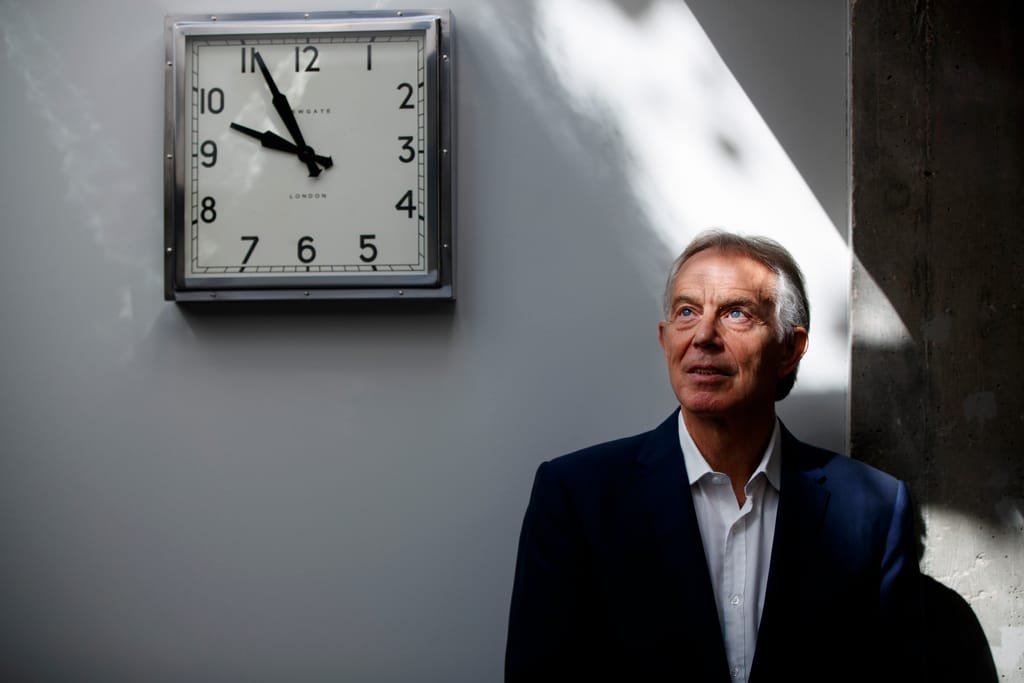The former U.K. prime minister has quietly been meeting Labour’s new MPs — and he’s not the only Blairite who’s at it.

LONDON — In a discreet boardroom last month in Fitzrovia, central London, hand-picked Labour MPs sat down with the man many of them had watched on TV growing up.
The croissants and pastries went mostly uneaten as Tony Blair discussed his pet issues — AI, digital ID and “disruptive” political delivery. The former prime minister then moved on to the other big item on his agenda: the state of politics in 2025.
The frank, hourlong breakfast meeting in the London HQ of Blair’s vast think tank, the Tony Blair Institute, was the first in a planned series of private talks this year between the ex-PM and “rising star” Labour MPs.
It’s hardly a surprise. Now 71, Labour’s longest-serving prime minister finished his period of silence on politics years ago. Blairspeaks out on everything from Brexit to Covid-19. He has met Labour rising stars before — including candidates ahead of last year’s election — and his think tank is pushing to influence policy. In one sense, this is just how Westminster works.
But Labour’s centrist landslide under Keir Starmer, its subsequent slip in the polls and the rise of populists worldwide may have given Blair new impetus.
The small meetings — last month’s involved just over half a dozen MPs — are more than just a think tank lobbying MPs on policy, people familiar with them said. The ex-prime minister also appears to be building a network, they said, shaping broader Labour politics and keeping an eye on talent of the future.
And he’s not the only Blairite who’s at it.
Dinner dates with Blairites
Blair’s former Business Secretary Peter Mandelson also met candidates before the election, and had dinner with new intake MPs last month at the south London home of Blair’s former Europe adviser Roger Liddle. Liddle cooked for the guests with his wife, and they had a wide-ranging discussion about global affairs as arch-networker Mandelson prepared for his new job as ambassador to Washington, D.C.
“It was very Peter Mandelson,” said one MP with knowledge of the event. A second added: “So much of the history of the Labour Party has been decided at Roger Liddle’s house.” Like almost a dozen others that POLITICO spoke to for this piece, they were granted anonymity to discuss private meetings.
Blair’s former Health Secretary Alan Milburn, who recently took up a senior non-executive job at the Department of Health and Social Care, also separately had a private dinner with new intake MPs last month, a person familiar with the event said.
A third new MP said that group was looking to share ideas and focus on tackling barriers to delivering in government, as well as on building “the future politics we need to change the country.”

In many ways the reasons for these dinners are simple: Labour people will always talk to each other, especially when they’re still trying to work out who their colleagues are. Tribes and factions among the 230-ish new Labour MPs still haven’t crystallized seven months after the election, though a fourth new MP said: “They’re definitely beginning to form. People are getting used to their jobs and out of that, alliances are built.”
Others are more cynical about the motives of Blair and his fellow travelers. “I think they’re trying to collect us,” said a fifth new Labour MP.
Staying on message
The current prime minister also does his bit when it comes to building networks in Westminster.
Long before he landed in No. 10 Downing Street, Keir Starmer was not known as a clubbable figure in parliament’s bars, and preferred to hold meetings in Labour’s professionalized HQ rather than the rabbit warren of rooms in the Palace of Westminster.
But he has been hosting regular lunches on Wednesdays, after prime minister’s questions, with around a dozen new MPs at a time in his House of Commons office. On the menu are Pret a Manger sandwiches, “sh*t crisps,” political strategy — and MPs raising a laundry list of asks for their constituencies, according to a sixth new MP.
Not that these always please the new intake. Starmer’s packed diary means they are often brief. “They’re a box-ticking exercise. They’re very staccato. You get half an hour with him and about two minutes to say your piece,” said a seventh new MP.
Perhaps Starmer will take a leaf out of Blair’s book. John McTernan, Blair’s former director of political operations, argued the Labour PM poured considerable efforts into keeping his back benches sweet, even when he had a huge majority.
“Tony knew the importance of engaging with backbenchers not simply to sell the government narrative but also to spot the rising talent,” McTernan said. “We had regular receptions in No. 10 for the regional groups of MPs and made sure to invite their partners and spouses — we knew how important the partners were as message carriers back in the constituency.”
Charlie Falconer, Blair’s former flatmate who became the ex-PM’s justice secretary, added: “The [Parliamentary Labour Party] as an organism is almost a key determiner of the mood and the values of the government … the prime minister’s got to explain what’s going on the whole time. You’ve got to have this sense that the driver is driving hard in a particular direction.”
Secrets and allies
Getting the full guest lists for Blair’s meetings these days is fraught with difficulty — the ex-PM does not want to speak about them publicly. But the groups for all three meetings appear to be heavy on parliamentary private secretaries (PPSs) — the most junior government posts, nicknamed “bag-carriers,” given to aspiring members of the new intake.
When there are so many new MPs to choose from, the PPS list is a good place to start. An eighth new MP said wryly: “It’s just flattery. Everyone is told they’re a rising star. There are 230 rising stars in the PLP at the moment.”
It’s not just new MPs, though. Blair sat down with Deputy Prime Minister Angela Rayner for a half-hour softball interview on Dec. 18 at the TBI’s Christmas reception. Picking Rayner, an ally of the unions seen more on Labour’s “soft left,” was an extension of Blair’s usual political reach.
“I think it shows a need to reassert relevance,” said a ninth MP — not just for Blair but also for the TBI, which was dwarfed by rival think tank Labour Together in the influence game before the general election. “I think they want to get back into the fold.”
Whisper it, but there could always be another reason. There is already occasional chatter among Labour MPs about who might succeed Starmer as leader one day. One frontbencher said: “I assume — and I have no evidence to support this at all — that they’re looking at what, or rather who, comes next.”
All that is premature for now — Starmer sits astride a huge majority of MPs who are mostly supportive of the party line (in public, at least). But it’s always useful to have alliances for the future.





